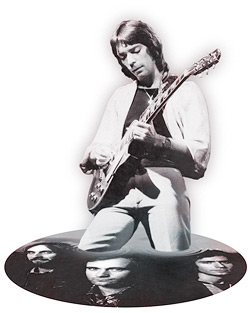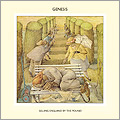



This summer [of 1997] saw the 20th anniversary of Steve Hackett's leaving Genesis. Since this marks the end of one era of the band and the beginning of another we decided to take a closer look at the background of that step.
Steve joined Genesis in the winter of 1970/71. With the bands he had played in before not matching his musical ideals he found Genesis a promising change. Like Phil Collins, who had joined the band just before him, he came from a middle class family and, unlike Tony, Mike and Peter, had not attended public schools. This certainly set them apart a bit. As a rather outgoing personality Phil probably had fewer problems overcoming that difference. Steve, on the other hand, was rather introverted, but he soon found his feet in the band.
The years that followed were marked by Genesis' early success as well as the advantages and disadvantages of continuously being together. In those years Genesis were constantly either touring or recording or rehearsing. The recording sessions for Selling England By The Pound (1973) and The Lamb Lies Down On Broadway (1974) brought about a crisis in the band. Peter's departure began to loom on the horizon and dampened the spirits. It was apparently in this period when Steve started considering a solo career. When the Lamb tour had ended in May 1975 Steve recorded his first solo album, Voyage Of The Acolyte, which came out in October '75 and reached #26 in the UK charts. He realized that he could be successful outside of Genesis and enjoyed not having to submit to the democratic decision-making in the band.
Before he could finish this thought Genesis began recording a new album. It would be their first one without Peter, and the band wanted to prove themselves to fans and critics alike. Steve relished in the task. But when they were working on Wind & Wuthering a year after that he found himself becoming dissatisfied. He had had many ideas for new songs since Voyage Of The Acolyte, and he felt that either Genesis should use a fair share of those songs or he should be given the opportunity for further solo records. The band disapproved of the latter idea, but at the same time many of his musical ideas fell through with the band because they moved away from what Tony, Mike and Phil envisioned for Genesis. However that may have been, Steve recorded Wind & Wuthering with Genesis, where he is not really under-represented according to the credits. The world tour after that would, however, be Steve's last in Genesis.
Genesis had their four shows in Paris in mid-June 1977 recorded, and two weeks later, when the tour had ended, they began to review and mix the material in the studio, when one day Steve announced he was leaving. He had debated with himself for a long time whether he should leave or not, and the rest of the band had been aware of that. The new live album Seconds Out may have been a decisive factor, for Steve was very unhappy with the mix. He left the band, but Tony, Mike and Phil were neither surprised nor did they think he left quite as big a gap as Anthony and Peter had left behind them. Somehow he had not become as integral a part of the band as the others. He had stayed his distance, as it were, which often made him the outsider. He probably did not enjoy the role, and so he decided at one point in summer 1977 to break out and go his own way.
This meant that he could work on his own ideas. His next solo albums made it clear that those were rather incompatible with the way Genesis went. The price Steve had to pay for his independence was a much smaller (commercial) success than his former band. They slowly turned into a super group with countless hits. Steve enjoys moderate success with his fan community who are still wistful for the Genesis era up to 1977 - and perhaps rightly so because with every band member that left Genesis lost part of its musical spectrum. This was true in 1997 and is still true today, twenty years later, when, as on Calling All Stations, drummers play songs on a Genesis album they have not co-written. And it certainly would not hurt the sound of Genesis if they had a permanent guitarist to support Mike.
Another fifteen years on Genesis have a moderately successful new formation and a very successful farewell tour with the "small reunion" lineup behind them. It seems more than doubtful whether Genesis will ever give another sign of life, e.g. an album or a live show. Steve, however, does not seem to want to consider retirement for a long time. He has been working on his career during these 15 years and has been very creative despite (or because?) his private problems and, actually, quite successful commercially. The notable thing is his repeated looks back at his former band, be it in the live shows or, to mention a current new item, the upcoming Genesis Revisited II. While Collins, Banks and Rutherford seem to have closed the book of Genesis and their solo projects are not guaranteed to shoot up the charts anymore, it is the dropouts Peter Gabriel and Steve Hackett who keep the spirit of Genesis alive: Peter does it in a more visual and contemporary way while Steve's approach is musical and retrospective - but both these ways may delight the fans of the 1971-77 era more than modern pop and/or orchestral albums.
by Helmut Janisch, English by Martin Klinkhardt
photos by an unknown photographer



The 1973 Classic, remastered on CD in 2008.
Review available